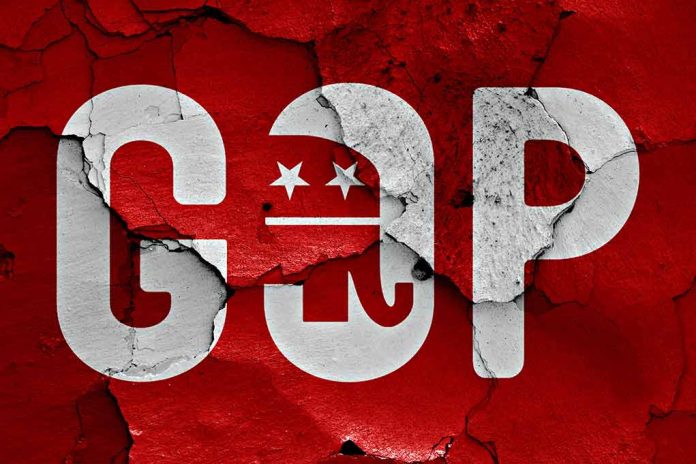
President Trump’s decision to impose 100%+ tariffs on Chinese goods has sent markets tumbling and splintered Republican unity, with some GOP senators joining Democrats in a legislative push to rein in presidential tariff powers.
Key Takeaways
- A bipartisan bill introduced by Sen. Maria Cantwell (D-WA) and Sen. Chuck Grassley (R-IA) would require congressional approval for presidential tariffs within 60 days of implementation
- Seven Republican senators have broken ranks to support the bill amid growing concerns about market instability and economic impacts
- President Trump has threatened to veto the legislation, calling the tariffs necessary to address trade deficits with China
- The Dow Jones Industrial Average dropped over 1,200 points following the tariff announcement, triggering panic among investors
- Treasury Secretary Scott Bessent and trade adviser Peter Navarro are reportedly at odds over the economic strategy
Bipartisan Push to Check Presidential Tariff Authority
In a significant challenge to President Trump’s trade agenda, Senators Maria Cantwell (D-WA) and Chuck Grassley (R-IA) have introduced legislation requiring congressional approval for tariffs. The bill would mandate that any president notify Congress of impending tariffs within 48 hours, with lawmakers then having 60 days to approve the action. This represents the most substantial legislative effort to date to curtail presidential authority on trade matters since Trump took office in January. The measure has garnered support from seven Republican senators, highlighting growing concerns within the GOP about the economic implications of Trump’s aggressive tariff strategy.
President Trump has already threatened to veto the bill if it reaches his desk, though its prospects in the Republican-controlled House remain uncertain. The administration maintains that tariffs are essential tools for addressing trade imbalances, particularly with China. Meanwhile, Senator Ron Wyden (D-Oregon) is introducing a related resolution to force a vote on the emergency declaration under which Trump instituted the global tariffs, creating a two-pronged legislative challenge to the president’s trade policies.
Good morning, and God bless, #Team42!
Today’s Key Macro Question(s): Technical recession or actual recession?
In a Rose Garden event yesterday that he dubbed, “Liberation Day,” @POTUS announced a 10% minimum tariff on all exports to the US, plus “reciprocal” tariffs on ~90… pic.twitter.com/EidWj7v3BD
— Darius Dale (@DariusDale42) April 3, 2025
Market Turbulence Rattles GOP Confidence
The immediate fallout from President Trump’s announcement of tariffs exceeding 100% on Chinese goods has been severe market instability. Wall Street responded with significant selloffs, with the Dow Jones Industrial Average plunging more than 1,200 points in the days following the announcement. This volatility has alarmed Republican lawmakers who initially supported Trump’s tough stance on China but now fear the potential for a prolonged trade war. The president’s core supporters maintain that short-term market pain is necessary for long-term economic realignment, but cracks are appearing in this unified front as constituents express concerns about rising consumer prices.
Reports of internal administration discord have further complicated the situation. Treasury Secretary Scott Bessent is said to be at odds with trade adviser Peter Navarro over the scope and implementation of the tariffs. This tension mirrors the broader division within the Republican Party between traditional free-market advocates and those embracing Trump’s more protectionist approach. The public disagreement has undermined confidence in the administration’s economic strategy at a time when markets are already jittery.
Economic Impact Concerns Mount
As the trade conflict escalates, concerns about broader economic consequences are growing among Republicans in Congress. Agricultural states, many represented by GOP senators, are particularly vulnerable to retaliatory tariffs from China, which has historically targeted American farm products. Manufacturing sectors dependent on Chinese components are reporting cost increases that threaten jobs in states crucial to Republican electoral prospects. Small businesses across the country face difficult decisions about whether to absorb these additional costs or pass them along to consumers.
“We are the conduit to those constituents. Those sectors of the economy, like agriculture or manufacturing or small business who are being hurt,” said Sen. Maria Cantwell.
Senator Cantwell has emphasized that many consumers are beginning to question the tariffs’ value as they see prices rise on everyday goods. “Wait, why am I paying this extra tax on these consumer goods? I don’t want to do it,” she noted, capturing the sentiment of many Americans beginning to feel the pinch. Rather than tariffs, Cantwell advocates building coalitions with allied nations to counter China’s trade practices, along with investing in innovation, workforce development, and maintaining open markets to enhance American economic leadership and job creation.
Sources:
- Farm-state Republicans rocked by tariffs fear Trump lacks exit strategy
- Sen. Maria Cantwell says there is bipartisan support to rein Trump’s tariffs
- GOP mood grows darker on Trump tariffs as markets give up their gains



